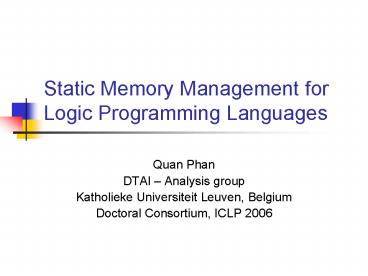Static Memory Management for Logic Programming Languages PowerPoint PPT Presentation
1 / 14
Title: Static Memory Management for Logic Programming Languages
1
Static Memory Management for Logic Programming
Languages
- Quan Phan
- DTAI Analysis group
- Katholieke Universiteit Leuven, Belgium
- Doctoral Consortium, ICLP 2006
2
Outline
- Motivation
- Memory management in logic programming
- Literature on static memory management
- My research
- Research goal
- Current status
- Expected achievements
3
Memory management in logic programming
- Logic programming is declarative
- Focus on WHAT, not HOW
- No malloc/free
- Automatic management of the heap
- Instant reclaiming
- Rely on backtracking
- Not enough deterministicshallow backtracking
- Runtime garbage collection
- Effectively recover, gt 90 of the garbage
- Problem runtime overhead, time-unpredictable
4
1. Region-based memory management (RBMM)
Basic idea
The heap
- Heap regions
X
.
- Terms distributed over regions
.
1
- Release the whole region at once
2
Y
.
3
.
Z
.
.
5
1. RBMM Practice
- The compiler
- decides about regions
- and region lifetime
- adds creation/removal instructions
6
1. RBMM
- An extensive research field in functional
programming - Mostly SML
- Region inference is type-based analysis
- More recently C, Cyclone, Java
- For logic programming
- application to WAM-based Prolog by Henning
Makholm Kostis Sagonas - Focus runtime support for nondeterminism.
- Borrow region inference from SML
7
2. Compile-time garbage collection (CTGC)
- Idea instead of releasing, reuse allocated
memory cells for new terms - Practice
- CTGC for Mercury language
- Structure sharing analysis, liveness analysis ?
reusable cells - Reuse locally inside procedure
8
2. CTGC
- append(X, Y, Z) -
- (
- X ,
- Z Y
- X gt Xe Xs,
- append(Xs,Y,Zs),
- Z lt Xe Zs
- ).
X
.
1
1
.
.
2
2
Z
.
.
Y
.
3
9
Advantages of static approach
- Performance
- Reasoning is done at compile-time
- Competitive runtime no or less RTGC needed
- Always better performance? Non conclusive, due to
locality, runtime overhead of new instructions,
region management, but at least more
time-predictable - Competitive memory consumption
- Reuse or reclaim all the garbage memory
- Let programs run in linear space
10
Research goal
- Study the possibility and practicality of a
hybrid memory management system that combines
RBMM and CTGC. - How to combine?
- Memory management is both theoretic and
experimental - build and test systems in practice
- a good thing, for which programs?
11
Current status First step
- RBMM Analysis for Mercury
- same context with the only CTGC system
- The algorithm three phases
- Region points-to analysis build the memory model
- Region liveness analysis decide region lifetime
- Source-to-source transformation add creation and
removal instructions
12
Current status First step
- More information
- Quan Phan and Gerda Janssens. Towards
Region-based Memory Management for Mercury
programs. Proceedings of the Colloquium on
Implementation of Constraint Logic Programming
Systems, CICLOPS 2006, Seattle, USA, Aug. 2006. - Presentation at CICLOPS, 15h, Monday 21/8, in
???.
13
Ongoing work
- Modular region analysis
- Module system is critical for software
engineering - A challenge
- Region analysis is global
- Research is little on this problem, only one work
exists - Idea make the analysis local, allow callers to
control callees behaviour. - More precise region points-to analysis
- Study the hybrid system
- The operation of CTGC when memory is organized in
terms of regions - The cooperation among RBMM, CTGC and RTGC.
14
Expectation
- A programming system
- better memory footprint,
- runtime overhead on memory task is reduced
- flexible static memory management strategy
- which strategy performs best for what kind of
programs. - which combination often works effectively

